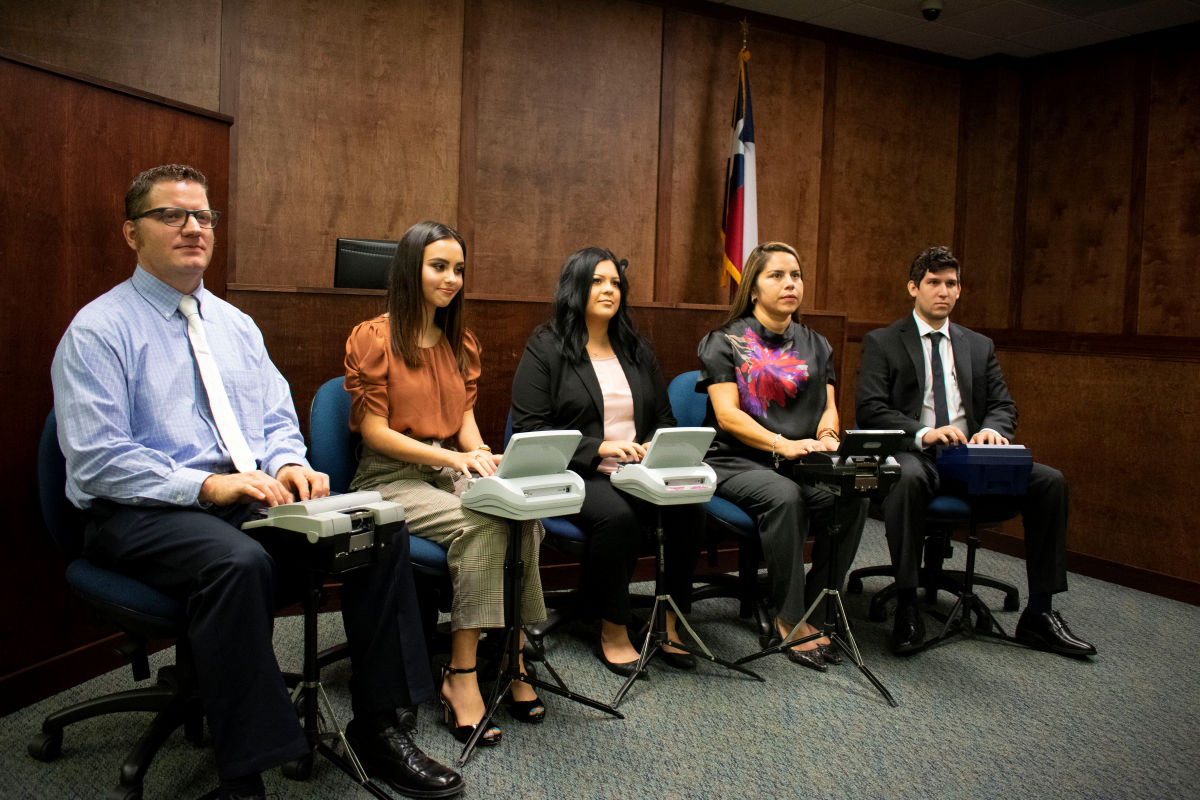Recognizing the Value of Court Coverage in Legal Solutions and Process
Court reporting plays an essential function in the lawful landscape, offering as the foundation of exact documents in numerous lawful process. By providing verbatim transcripts, court reporters make certain that every testament and argument is diligently recorded, thereby protecting the stability of the judicial procedure.
Function of Court Reporters

In enhancement to transcription, court press reporters are usually entrusted with handling and keeping the circulation of procedures. They need to be proficient in lawful terms and possess a detailed understanding of court protocols to make sure that the document shows the context and nuances of the dialogue. Their work might also expand past traditional courtrooms, including administrative hearings, settlements, and other lawful setups where documentation is essential.
Additionally, stenotype reporter may give real-time coverage, allowing prompt access to records throughout procedures, which can be critical for the reliable administration of justice. By guaranteeing that a specific record is kept, court reporters maintain the integrity of the lawful process, offering and helping with allures as a crucial resource for lawful experts in their pursuit of justice.
Relevance of Accuracy

The role of accuracy expands past mere transcription; it encompasses the capability to record the subtleties of speech, including tone, focus, and non-verbal signs, which can be crucial in comprehending the context of declarations made. An accurate record makes sure that all celebrations entailed-- courts, lawyers, and courts-- have access to the exact same details, fostering fairness and transparency in the judicial process.
Additionally, exact records are vital for the appellate process, where higher courts count on them to evaluate lower court decisions. Mistakes can threaten the end result of an allure, possibly affecting a party's freedoms and rights. Thus, the commitment to accuracy in court reporting is not simply a professional responsibility but a keystone of justice that promotes the policy of legislation.
Types of Lawful Process
Treatment a broad range of lawful contexts, court press reporters are necessary in different types of lawful procedures, each requiring distinctive techniques and skills. Among one of the most typical kinds are civil litigation, criminal trials, and management hearings. In civil litigation, stenotype reporter record depositions, activities, and testimonies, guaranteeing that every information is documented accurately for possible appeals or negotiations.
In criminal trials, the duty of court reporters comes to be also much more critical, as they record all aspects of the process, including court selections, witness statements, and punishing phases - Court Reporting. The precision and immediacy helpful site of these records are extremely important, provided the possible consequences for offenders and the stability of the judicial system
Management hearings, frequently conducted by governmental companies, additionally rely upon stenotype reporter to maintain official documents of procedures. These hearings can involve conflicts concerning regulative conformity, employment problems, or specialist licensing, necessitating specific documentation.
Additionally, specialized procedures such as adjudication and mediation call for stenotype reporter to record the nuances of contracts and arrangements. Each kind of lawful case presents distinct difficulties, highlighting the relevance of seasoned stenotype reporter in supporting the stability of the legal process.
Innovation in Court Reporting
Improvements in innovation have reinvented the field of court coverage, improving both effectiveness and precision in the transcription process. Conventional methods of manual note-taking have been supplemented and, in many cases, changed by innovative electronic tools that enhance process and improve accuracy (Court Reporting). Court press reporters currently make use of sophisticated steno makers furnished with real-time transcription abilities, enabling for immediate accessibility to a verbatim account of process
Additionally, the combination of speech recognition software application has further changed the coverage landscape. This innovation enables the automated transcription of spoken words, substantially decreasing the moment needed for creating main documents. Additionally, cloud-based systems assist in easy storage space and retrieval of transcripts, making certain Recommended Reading that attorneys can access essential records from anywhere, any time.
Video conferencing devices have also arised as important components in remote depositions and hearings, assisting stenotype reporter record procedures in real-time, despite area. The combination of these technical developments not just improves the accuracy of legal documents however also sustains a more reliable and versatile legal process. As the area remains to progress, accepting these advancements will certainly be important in satisfying the growing needs of the legal market.
Moral Factors To Consider in Reporting
The combination of technology in court reporting brings with it a collection of ethical factors to consider that specialists should browse carefully. As court press reporters increasingly utilize electronic tools, problems bordering honesty, confidentiality, and accuracy come to the forefront. Securing delicate details is paramount; reporters should make certain that any electronic documents are securely stored and shared only with licensed people.
Moreover, the accuracy of transcriptions is vital. Using software for real-time reporting does not absolve court reporters from the obligation of making certain that the end product is exact. Moral commitments determine that any kind of mistakes have to be without delay dealt with and connected to pertinent events.

Finally, compliance with legal requirements and market guidelines is necessary. Court press reporters need to remain informed regarding progressing honest standards to copyright the trust positioned in them by the legal system. By resolving these honest factors to consider, stenotype reporter can remain to supply indispensable solutions in legal process while maintaining public self-confidence.
Conclusion
To conclude, court reporting plays a crucial find more role in the legal system by making certain reputable and exact paperwork of judicial process. The meticulous work of court press reporters upholds the stability of the lawful process and supports the legal rights of people involved. The combination of modern technology enhances effectiveness while keeping ethical standards. Eventually, the relevance of court reporting can not be overstated, as it works as a crucial foundation for fairness, transparency, and the efficient management of justice.
Court reporting plays a crucial function in the legal landscape, offering as the foundation of precise documentation in numerous lawful proceedings.Court press reporters constantly play an important role in the judicial process by producing precise, verbatim transcripts of lawful process.Moreover, accurate transcripts are important for the appellate procedure, where higher courts depend on them to assess lower court decisions.Treatment a large selection of lawful contexts, court reporters are vital in various types of legal procedures, each requiring distinct approaches and abilities. By addressing these moral factors to consider, court press reporters can proceed to supply vital solutions in legal proceedings while keeping public self-confidence.